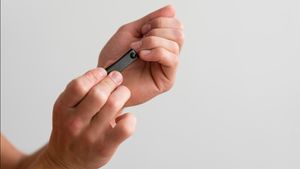JAKARTA - The high level of sugar in the blood is the cause of the high risk of diabetes. In addition, excessive sugar consumption can lead to an increase in weight that leads to obesity and interferes with fertility.
An obstetric and gynecologist specialist who graduated from the University of Indonesia, Dr. dr. Gita Pratama, Sp.O.G, Subsp. F. E. R, M.Sc. Rep. explains that obesity risks disrupting the function of hormones in the body, including hormones involved in fertility such as reproductive hormones.
"This condition can cause ovulation disorders and menstrual disorders without the issuance of eggs (anovolution) that make it difficult for pregnancy," Gita said as quoted by ANTARA, Thursday, November 16.
In addition to obesity, consuming too much sugar can also cause insulin resistance, namely that the body's condition cannot respond to insulin properly. This can interfere with blood sugar circulation in the body and increase the risk of a person holding type 2 diabetes.
"Women with insulin resistance or type 2 diabetes are more susceptible to fertility disorders, such as ovulation disorders," said Gita.
In pregnant women, excessive sugar consumption can also increase the risk of gestational diabetes or diabetes. Gestational diabetes is associated with an increase in the incidence of premature birth, miscarriage, preeclamancy, polyhydromnion or excess fluid, caesarean childbirth due to a large baby weighing more than 4 kilograms, and post-lamber bleeding.
SEE ALSO:
Doctor's advice
Gia suggests that women with obesity and insulin resistance or type 2 diabetes, however, want to have offspring, should immediately consult a specialist in obstetrics and jenecology, a reproductive endocrinological fertility subspecialist.
Doctors will recommend reducing weight with the right diet and exercising regularly. Sometimes, he added, treatment therapy is also needed to lower insulin or sugar levels in the blood.
Then, in order to prevent fertility disorders, he advises people to adopt a healthy lifestyle, one of which is to meet a balanced nutritional intake, namely adequate carbohydrates, protein, fats, and vegetables, and fruit. In addition, it is also important to eat foods with low glycemic index or foods that are not quickly converted into sugar in the blood, such as whole whole grains or whole grains, fruits, and high fibered vegetables.
It is better to avoid foods that contain high calories or contain high saturated fats, such as fast food, fried foods, rice, white bread, cakes, and excessive amounts of sweet drinks.
The Ministry of Health in Regulation of the Minister of Health Number 30 of 2013 recommends a maximum limit for daily sugar consumption, which is 10 percent of the total energy required or 200 kilocalories per day.
"Referring to these limits, it means that in a day adults can consume a maximum of 50 grams of sugar per day or the equivalent of 4 tablespoons," said Gita.
Meanwhile, for people with diabetes, daily sugar restrictions need to be consulted again with the treating doctor.
He reminded that a healthy lifestyle is not enough by just adjusting your diet, but also exercising regularly, avoiding alcohol and cigarettes, managing stress properly, and fulfilling rest time.
"Although not all foods or sweet drinks are directly dangerous, excessive and sustainable sugar consumption can increase the risk of various diseases, including their negative impact on fertility," Gita said.
The English, Chinese, Japanese, Arabic, and French versions are automatically generated by the AI. So there may still be inaccuracies in translating, please always see Indonesian as our main language. (system supported by DigitalSiber.id)

















